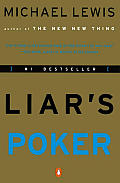
| Publisher: | Penguin |
| Copyright: | 1989 |
| Printing: | 1990 |
| ISBN: | 0-14-014345-9 |
| Format: | Trade paperback |
| Pages: | 249 |
I first encountered Michael Lewis through Moneyball, his excellent book on statistics-driven baseball management. It's a great book and an exception to my general dislike of sports books, but it also left me mentally filing Lewis into the sports writer category and not that likely to write other books I wanted to read. But then I found an excellent piece he wrote for Portfolio on the current banking crisis, followed by a wonderfully entertaining article for Vanity Fair on the collapse of the Icelandic banking system. Based on those, I looked further and picked up Liar's Poker, to which the Portfolio article is a sort of postscript.
Liar's Poker is about bond trading at Salomon Brothers during the financial boom of the 1980s. Lewis, fresh out of the London School of Economics, was hired by them in 1985. He became a bond salesman with the London office of the company, apparently a fairly successful one, before leaving the firm in 1988. Liar's Poker is about half biography, following Lewis's training and career, and half the history of "modern" bond trading at Salomon Brothers. In pursuit of the latter, Lewis goes back as far as the late 1970s, when John Gutfreund became managing director. Salomon Brothers was swallowed by Citigroup in 1998, but not before it invented mortgage-backed securities, played a significant role in junk bonds, and inspired (in part) The Bonfire of the Vanities.
The first thing I noticed about Liar's Poker, the aspect that jumps out to a current reader, is the degree to which it prefigures both the current financial crisis and some of the elements of Enron's collapse. The historical roots of the current crisis have been covered elsewhere, but Lewis provides more detail and feel for the attitude inside the company. The corporate attitude of egotistical intelligence, greed, everything-goes capitalism, and the willingness to manipulate and invent markets in pursuit of profit that Lewis portrays bears a remarkable resemblence to accounts of the internal politics and attitudes at Enron. Based on the fallout from the mortgage crisis and the antics on CNBC, I suspect it remains common on trading floors to this day.
This is not a work of journalist-quality investigation. Both the biographical aspect and Lewis's colorful storytelling technique work against that. Rather, Liar's Poker struck me as a personal exploration of the motives and attitudes behind the trading floor of a dominant Wall Street firm, the mindset that it taught its trainees (and that the trainees brought into the firm), and the way financial feedback and firm culture enabled and rewarded incredibly antisocial behavior. It lacks the journalistic integrity and methodical investigative approach of McLean & Elkind's exceptional The Smartest Guys in the Room about the collapse of Enron, but it adds an insider perspective. Lewis tries to stay the observer, but he benefitted hugely from that culture, was caught up in the unreality of it and the obscene amounts of money flowing through the hands of people like himself with remarkably little training, and came across to me as conflicted about his role and involvement. I suspect his personal involvement in the story makes it less fully accurate, and I suspect some of the anecdotes of being exaggerated to tell a better story, but it adds an interesting feeling of expiation.
As in Moneyball, Lewis is excellent at explaining complex systems. His brief histories here of junk bonds and mortgage-backed securities are well worth the price of the book. He presents a detailed account of the origin of mortgage-backed securities in the savings and loan crisis alongside the best explanation I've ever heard of why the invention of those securities was a watershed event in financial markets. Until reading this book, I hadn't understood the scale of money involved, the difficulties in securitizing mortgages so that they looked like traditional bonds, or the links with savings and loans. The junk bond explanations are also valuable, if somewhat less timely and now a more traditional part of the financial landscape.
Liar's Poker has a tendency to meander, leaving me with a grab-bag impression. There's a bit of history, a lot of biography, a catalog of extremely unappealing people and a viciously sophmoric culture, a few fascinating characters, and a bizarre fantasyland of more money than one can hope to understand. It's not a book with solutions; it is a book that will give one a deep dislike and mistrust for the Wall Street trading culture and which drives home the ways in which Wall Street firms are not on the side of their supposed clients. I would be suspicious of the sheer ugliness of the culture Lewis portrays had not every other episode, such as Enron, that opened the lid on that culture revealed similar scurrying cockroaches. As is, whether or not individual anecdotes are entirely accurate, I suspect that Lewis has captured the cultural mindset all too well.
This is not a work at the level of The Smartest Guys in the Room or even Moneyball, but it's an interesting book that filled in some historical gaps for me. It's also less dated than one might think. Read Lewis's magazine articles linked above first, but if you like their style, Liar's Poker is worth picking up.
Reviewed: 2009-04-20